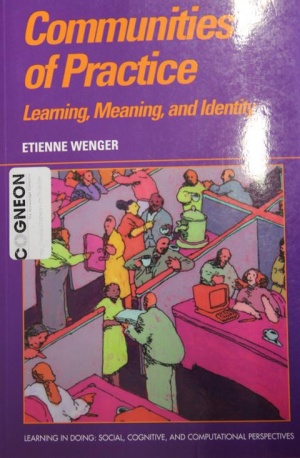Communities of Practice: Learning, Meaning, and Identity: Unterschied zwischen den Versionen
Keine Bearbeitungszusammenfassung |
Keine Bearbeitungszusammenfassung |
||
| Zeile 23: | Zeile 23: | ||
* [http://books.google.de/books?id=heBZpgYUKdAC&dq=communities+of+practice&hl=de&source=gbs_navlinks_s ''{{PAGENAME}}'' bei Google Books] | * [http://books.google.de/books?id=heBZpgYUKdAC&dq=communities+of+practice&hl=de&source=gbs_navlinks_s ''{{PAGENAME}}'' bei Google Books] | ||
* [http://www.amazon.de/Communities-Practice-Cognitive-Computational-Perspectives/dp/0521663636 ''{{PAGENAME}}'' bei Amazon] | * [http://www.amazon.de/Communities-Practice-Cognitive-Computational-Perspectives/dp/0521663636 ''{{PAGENAME}}'' bei Amazon] | ||
__NOTOC__ | |||
Version vom 27. März 2014, 14:37 Uhr
Info
- Titel: Communities of Practice
- Untertitel: Learning, Meaning, and Identity
- Autor: Etienne Wenger
- ISBN: 978-0521663632
- Erscheinungsjahr: 1998
- Verlag: Cambridge University Press
- Sprache: englisch
- Seiten: 318
Communities of Practice presents a theory of learning that starts with this assumption: engagement in social practice is the fundamental process by which we learn and so become who we are. The primary unit of analysis is neither the individual nor social institutions but rather the informal "communities of practice" that people form as they pursue shared enterprises over time. In order to give a social account of learning, the theory explores in a systematic way the intersection of issues of conceptual framework for thinking about learning as a process of social participation. This ambitious but thoroughly accessible framework has relevance for the practitoner as well as the theoretician, and is presented with all the breadth, depth, and rigor necessary to adress such a complex and yet profoundly human topic[1].
Siehe auch
Einzelnachweise
- ↑ Wenger, E.: Communities of Practice: Learning, Meaning, and Identity
Weblinks
- Communities of Practice: Learning, Meaning, and Identity bei Google Books
- Communities of Practice: Learning, Meaning, and Identity bei Amazon
